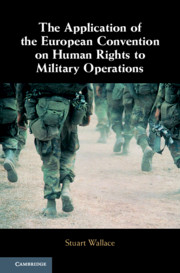Book contents
- The Application of the European Convention on Human Rights to Military Operations
- The Application of the European Convention on Human Rights to Military Operations
- Copyright page
- Dedication
- Contents
- Acknowledgements
- Abbreviations
- Table of Cases
- Table of International Agreements
- Introduction
- 1 Jurisdiction over Domestic Military Operations
- 2 Jurisdiction over Extra-Territorial Military Operations
- 3 Article 2: Substantive Obligations
- 4 Article 2 Procedural Obligations
- 5 Norm Conflict
- 6 Article 7
- 7 Derogation
- Conclusion
- Bibliography
- Index
Introduction
Published online by Cambridge University Press: 04 April 2019
- The Application of the European Convention on Human Rights to Military Operations
- The Application of the European Convention on Human Rights to Military Operations
- Copyright page
- Dedication
- Contents
- Acknowledgements
- Abbreviations
- Table of Cases
- Table of International Agreements
- Introduction
- 1 Jurisdiction over Domestic Military Operations
- 2 Jurisdiction over Extra-Territorial Military Operations
- 3 Article 2: Substantive Obligations
- 4 Article 2 Procedural Obligations
- 5 Norm Conflict
- 6 Article 7
- 7 Derogation
- Conclusion
- Bibliography
- Index
Summary
- Type
- Chapter
- Information
- Publisher: Cambridge University PressPrint publication year: 2019



